Sat 27 Feb 2021
A PI Movie Review by David Friend: TONY ROME (1967).
Posted by Steve under Mystery movies , Reviews[7] Comments
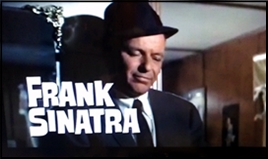
TONY ROME. 20th Century Fox, 1967. Frank Sinatra, Jill St. John, Richard Conte, Sue Lyon, Gena Rowlands, Simon Oakland, Jeffrey Lynn, Lloyd Bochner, Rocky Graziano, Shecky Greene. Title song: “Tony Rome,” written by Lee Hazelwood, performed by Nancy Sinatra. Screenplay by Richard Breen, based on the novel Miami Mayhem by Anthony Rome (Marvin H. Albert). Directed by Gordon Douglas.
Cop-turned-private detective Tony Rome (Frank Sinatra) lives on a powerboat in Miami. In a captain’s hat and a yellow turtle-neck, he is enjoying the sunshine when he gets a call from Ralph Turpin. The pair were partners in the police but now hate each other. Now a “hotel dick,†Turpin has discovered a young, drunk woman lying unconscious in one of the rooms. He and the manager want her out before the police start bothering them and are ready to pay Rome for the service.
Diana Pines, it turns out, is not just anyone, but the daughter of millionaire construction magnate Rudy Kosterman and her father is grateful when Rome brings her home. She has been acting strangely lately and he wants Rome to find out why. Meanwhile, Diana discovers her diamond pin has gone missing, believes it must have been stolen while she was drunk and wants it back. Now hired by the whole family, Rome investigates and soon finds the first of several dead bodies…
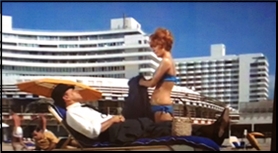
One of the interesting things about the 1960s is seeing how the more established stars handled it. Pretty much all of culture changed and many had to adapt. In the wake of The Beatles, Sinatra was not considered cool anymore and his film career faltered. He had always been the most credible of singers-actors, but Marriage on the Rocks (1965) and Assault on a Queen (1966) both failed at the box office while The Naked Runner (1967) received poor notices. In response, Sinatra turned to the kind of part which would fill out his remaining filmography.
Around this time, the film noir genre was making a minor resurgence, with Bulitt, Harper, P.J., Madigan and Marlowe. These films tried to recapture the grim and darkly glamourous world of The Big Sleep (1946) and Out of the Past (1947), which themselves were trying to evoke the hardboiled setting of the novels they were often adapting.
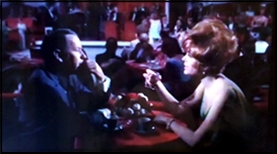
Sinatra was one of the first to get on board with this. Based on Miami Mayhem, a now-forgotten paperback original by writer Marvin H. Albert, Tony Rome cast him as a private detective in the wise-cracking Phillip Marlowe mold, a jaded yet honourable man in a disreputable business.
It’s not surprising that he fits the part. Many of Sinatra’s best songs – “One for My Baby,” “In the Wee Small Hours of the Morning” – conjure the kind of bars in which you would expect to find Sam Spade and Mike Hammer, while his trademark trilby made him look like them.
The film itself is colourful, both aesthetically and otherwise. The Floridian setting gives it a look which is quite at odds with the shadows and neon found elsewhere in the genre (though both the Travis McGee and Mike Shayne books were based around detectives in the Sunshine State).
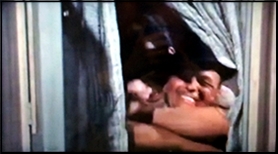
The deliberate way in which director Gordon Douglas focuses on young, bikini-clad women make it seem as though the Bond films were an equal inspiration. Nancy Sinatra – who sang the theme to You Only Live Twice the same year – performs the obligatory cheesy theme here while Diamonds Are Forever’s Jill St. John is Ann Archer, a three-time-divorcee whose main problem is being bored between parties.
Indeed, there is a seediness which is never less than overt as Rome meets junkies, prostitutes, strippers, blackmailers, gangsters and, of course, a murderer. It is balanced, however, with the usual sardonic humour which, in fairness, is genuinely amusing. There are many great lines here (“You’re not a family, you’re a bunch of people who live at the same address!â€).
The juxtaposition between the grim underworld and the sunny scenes of cheery impudence can be a little jarring, however, most notably in a running gag involving a honeymooning couple.
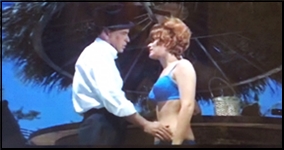
The plot is convoluted in the way that is expected from all private eye movies. Like most, it begins with a routine job that quickly gets more complex – something of which even Rome is aware. He is independently hired by each of the Kostermans and finds enough skeletons to fill a cemetery.
In-between times, he gets into the usual fights and chases, though they are more frequent in the first hour than the second, which drags noticeably. The film could certainly have been cut by as much as half an hour, such is the languid pace and extraneous shots of the scenery, which doesn’t always involve the weather.
As is the way with these things, the script has more names than a phone book and it is not always easy to match them. The motive, however, is an excellent one and clears up a story that, by the end, gets muddier by the moment.
An entertaining time-waster, Tony Rome makes up for its inconsistent tone and puzzling plot with Sinatra’s familiar, nonchalant charm and an unapologetic persistence in reminding you of the year it was made. A moderate hit at the box office, a sequel Lady in Cement) and Sinatra’s only, followed a year later.
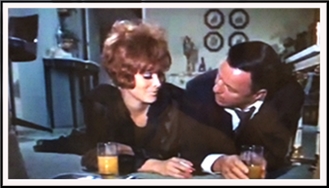
February 27th, 2021 at 10:21 pm
This is a fun review.
Jill St. John, wonder where she is now? She plays a character named, ‘Ann Archer’? Vavvoom. Wonder where Anne is now. Double voom.
When I reflect on Sinatra, I’m always rather amazed by how he evolved from the endless butt of industry-wide ‘skinny Frankie’ jokes to the powerhouse he eventually became. What an arc. When he started out, he was anything but a tough-guy. But then, just look at him in ‘Manchurian Candidate’. That’s a guy you’d want on your side.
Although ‘Tony Rome’ is just a movie based on a book based on a theme of noir, it does point to an intriguing, more-authentic, more-sprawling variety of American culture than we have today. At least I think so.
I’d certainly take ‘those primitive times’ over current times. If a movie like this is all we have left to call up the recollection, I’ll take it.
Well-spun reviewing above. Bravo.
February 28th, 2021 at 9:09 am
A film that makes a virtue of vulgarity, and one of my favorites. David evokes it admirably.
February 28th, 2021 at 2:15 pm
When Frank Sinatra did “Lady In Cement”, the second ‘Tony Rome’ picture, it occurred to some of us that maybe the Chairman was looking for a movie franchise for himself, to match up with Dino’s ‘Matt Helm’.
That ‘Rome’ stopped at two entries – well, everybody probably had their own set of excuses.
Personally, I tend to favor the idea that Sinatra was just going into the “phone-in” phase of his career (long before his “official” retirement, he’d scaled back his workload to next-to-nothing anyhow).
In the “What-If” mode, I could imagine Frank clocking in for maybe an annual ‘Matt Helm’ movie, with Marvin Albert contributing paperback tie-ins, and everybody banking checks – sort of like an annuity.
The next step might have been a Tony Rome TV series; of course, Sinatra wouldn’t have done it himself, but he did have a number of friends who could have used the paychecks.
What Might Have Been, and like that …
February 28th, 2021 at 3:07 pm
The full quote:
“For of all sad words of tongue or pen, The saddest are these: ‘It might have been!'”
February 28th, 2021 at 2:53 pm
I admit liking this and LADY IN CEMENT much more than they probably deserve, from getting to see Rat Pack hanger onner Richard Conte as Rome’s cop friend, to the seedy feel of the film with it’s casual and deliberate vulgarity.
The film captures a side of Miami usually ignored in glitzy films of the era though a couple of late era gangster films used the setting.
Sinatra is weary, jaded, human, and vulnerable as the hero and the cast, right down to Shecky Greene and Rocky Grazziano (who had played the sidekick to Lee Bowman in a short lived series set in Miami about a private eye who works for the hotels and resorts there) is perfect.
I would argue only here with MIAMI MAYHEM being “now forgotten.” It has been reprinted several times since it came out as by Anthony Rome if only because of the film tie. I’m not arguing it is as well known as Ross Macdonald or Mickey Spillane, only that it is not quite that obscure. I think it was last reprinted in the nineties.
LADY IN CEMENT closely resembles Chandler’s FAREWELL MY LOVELY, with Dan Blocker as a smarter Moose Malloy in one of his better big screen roles. And of course it has an often bikini clad Raquel Welch as follow up to Jill St. John.
But I grant I have much more affection for these two vulgar brightly colored private eye films than they may actually deserve and for Sinatra’s Tony Rome, who in his own way earns a spot among the better screen eyes and who is imbued with a real character arc and personality.
February 28th, 2021 at 2:57 pm
I even like the catchy theme song by Nancy Sinatra.
“And Tony Rome will get you if you don’t watch out …” can become a familiar earworm if I let it.
February 28th, 2021 at 3:01 pm
Well, why not?